|
|
|
Sort Order |
|
|
|
Items / Page
|
|
|
|
|
|
|
| Srl | Item |
| 1 |
ID:
123582
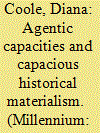

|
|
|
|
|
| Publication |
2013.
|
| Summary/Abstract |
In this article, I note that the idea of a new materialist turn has recently been gathering steam. The first part considers some of the signature elements of the new materialisms. The most distinctive aspect identified here is the invocation of a generative or vital ontology of immanence. Following discussion of some of its principal claims, the article draws out its implications for reconceptualising agency, in particular regarding the way agentic capacities are recognised to be distributed across animate, and perhaps also inanimate, entities. The significance of this development for the political sciences is then explored. In a second part, I suggest that the new materialism entails a normative project. Here, ethical overtures towards a new sensitivity predicated on vital materialist insights are contrasted with a renewed critical theory. The latter is commended as a material reckoning of the 21st century: a project provisionally labelled a capacious historical materialism.
|
|
|
|
|
|
|
|
|
|
|
|
|
|
|
|
| 2 |
ID:
124625
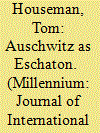

|
|
|
|
|
| Publication |
2013.
|
| Summary/Abstract |
The recent engagement with 'post-secular' thought has been especially pronounced within the critical tradition, in which messianic eschatology has been variously rehabilitated or reaffirmed. Amongst others, the thought of Theodor W. Adorno has recently been enlisted in this endeavour, culminating in a synthesis of critical theory and Jewish Gnosticism. This article argues that such a reading not only misrepresents Adorno's thought, but also misses its critical contribution. In contrast to the project of revivifying the messianic in order to save critical theory from aimless nihilism, Adorno's eschatology, inherited through a critical dialogue with Hegel, Marx and Benjamin, is a negative imprint, devoid of the theism, teleology and promises of salvation that characterise and secure other appropriations of the eschatological tradition. To recognise the originality and potency of Adorno's critical reworking of eschatology, I argue, we must understand the theological role played by Auschwitz throughout his writings. Adorno constructs a constellation in which Auschwitz is the eschaton, the horrific fulfilment of the promise of history. In doing so, he reconfigures the ethical impulse of the critical tradition: critical theory derives its purpose and urgency not from the promise of a better world, but from the horror of the present one.
|
|
|
|
|
|
|
|
|
|
|
|
|
|
|
|
| 3 |
ID:
144255
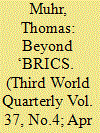

|
|
|
|
|
| Summary/Abstract |
Grounded in a review of past and present academic South–South cooperation literatures, this article advances ten theses that problematise empirical, theoretical, conceptual and methodological issues essential to discussions of South–South cooperation in the 21st century. This endeavour is motivated by the perceived undermining, especially in the contemporary Anglophone academic South–South cooperation literature, of the emancipatory potential historically associated with South–South cooperation. By drawing on the interventionist South–South cooperation agendas of ‘left’-leaning Latin America-Caribbean governments, the article seeks to establish a dialogue between social science theories and less ‘visible’ analyses from academic (semi)peripheries. The ten theses culminate in an exploration of the potential of South–South cooperation to promote ‘alternative’ development.
|
|
|
|
|
|
|
|
|
|
|
|
|
|
|
|
| 4 |
ID:
173912
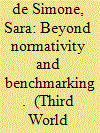

|
|
|
|
|
| Summary/Abstract |
The concept of human security became popular in the 1990s as a new framework for conceptualising security, shifting its referent from states to human beings and expanding its scope. While acknowledging the widespread criticism and rich debate that developed around the concept of human security after its appearance, this paper analyses the context in which human security emerged as a concept and reviews its different usages with a particular focus on its application to Africa and refugee-hosting areas. It maintains that the contribution of this concept goes beyond the simple statement that security is a matter of people’s lives. Thanks to its focus on subjective understandings of security, human security can be used as an analytical framework to produce context-specific knowledge about security based on people’s perceptions of what makes them secure/insecure and on local practices of human security – what people do to feel more secure. The application of a human security framework to refugee-hosting areas in Africa would contribute towards enhancing refugees’ agency in a context often dominated by a victimising narrative, as well as providing a comprehensive understanding of security priorities, providing important information for more context-specific policymaking.
|
|
|
|
|
|
|
|
|
|
|
|
|
|
|
|
| 5 |
ID:
073988
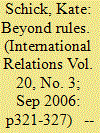

|
|
|
|
|
| Publication |
2006.
|
| Summary/Abstract |
This article critiques the liberalism that sustains human rights discourse as focused on rules to the detriment of focusing on the suffering of individuals. Too much human rights discourse has focused on the codification of human rights norms rather than the ways they are implemented and the failure to enforce them. International liberalism celebrates the advent of human rights whilst failing to confront the deeper structural dilemmas that the international political economic system generates. An engagement with critical theory leads to new ways of seeing human rights that might lead to alternative understandings of politics at the global level.
|
|
|
|
|
|
|
|
|
|
|
|
|
|
|
|
| 6 |
ID:
175128
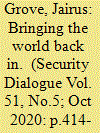

|
|
|
|
|
| Summary/Abstract |
Quantum physics is being positioned as a new archive for addressing major theoretical problems in the field of international relations. Two of the major proponents of engaging quantum thinking within international relations, James Der Derian and Alexander Wendt, have argued that quantum thinking offers the possibility of a major paradigm shift in the field. Before we determine quantum’s revolutionary potential, the persistent and most pressing question for me is how to position quantum thinking among other kinds of and claims to knowledge. I want to horizontalize where different kinds of knowledge sit within the renewed attention to quantum theory. Rather than just horizontalize or flatten ontology, I want to see what happens when we place scientific and philosophical inquiry in dialogue, and what that conversation does to the authority and value of quantum thinking for the social sciences. The article reconstructs the dialogue between the first generation of quantum physicists and the philosophers who informed them. Rather than make an explicit argument about the philosophical debt of physics, I argue that a broad and highly interdisciplinary set of questions drove both fields well beyond the specific areas of expertise of any of these thinkers. I believe this adventure of ideas followed by physicists, philosophers, and social theorists alike offers us a way forward as the complexity of our contemporary global challenges confront us now with the necessity to think well beyond our disciplinary expertise.
|
|
|
|
|
|
|
|
|
|
|
|
|
|
|
|
| 7 |
ID:
192202
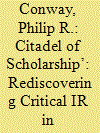

|
|
|
|
|
| Summary/Abstract |
‘Critical’ international relations (IR) is usually understood to have originated in the early 1980s. However, a close reading of Vithal Rajan’s ‘An Epitaph for Detached Scholarship’, published in the inaugural issue of Millennium in 1971, tells another story. Rajan’s article was not a work of critical theory per se, but it was in tune with demands, at this time, for establishing a ‘critical university’. Promising to open up university education to all, dispensing with traditional curricula and authoritarian modes of teaching, the critical university, like Rajan’s article, has long since been forgotten. Nevertheless, this moment set the scene for the professionalised establishment of ‘critical’ academia in the decades to come. Rediscovering Rajan’s ‘Epitaph’ thus offers to reconnect critical IR with an earlier, and perhaps more generative, moment of inception. Indeed, even today, Rajan’s creative, provocative, playful text stands out as a rewardingly undisciplined contribution to the discipline.
|
|
|
|
|
|
|
|
|
|
|
|
|
|
|
|
| 8 |
ID:
155153
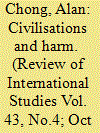

|
|
|
|
|
| Summary/Abstract |
Andrew Linklater’s Violence and Civilization in the Western States-System is to be both praised and critiqued for opening spaces for discussing civilisational standards in the era of a globalising world. It offers a healthy provocation for inquiry into how non-Western states ought to comprehend the legacies of Western political evolution colouring existing ‘IR’ as a discipline. Linklater’s book inspires three thematic reactions: globalisation does bring harm; the notion of a universal civilisation remains open to debate; and the possibilities of civilising patterns in premodern Southeast Asia serving as supplementary mirrors and extensions of the relationship between violence and civilisation. It is suggested that Linklater’s sequel must consider the trajectory of non-Western sociologies of IR.
|
|
|
|
|
|
|
|
|
|
|
|
|
|
|
|
| 9 |
ID:
175355
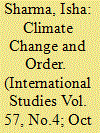

|
|
|
|
|
| Summary/Abstract |
As globalization gained currency in international politics, multilateral negotiations increasingly expanded their scope to include environmental issues. Still, the political dimension of environmental change remains underrepresented in international relations (IR) theorization. This article aims to focus on the theoretical fortification in the mainstream IR when it comes to transboundary environmental threats. Since the threats of climate change and environmental degradation cannot be contained within the sovereign territories of states, the state-centric conception of the political order in the conventional approaches to IR fails to respond to the threats that are planetary in nature. The article seeks to answer two questions: (a) What are the inadequacies in the realist and liberal concepts of political order vis-à-vis climate change? (b) How to destabilize the conventional assumptions of political order with the aim of making it more receptive to the concerns associated with climate change? To do the latter, the article delves into the work of Robert Cox in order to delineate his intersubjective approach, which combines the material basis of political order with social relations of production. By doing so, this approach also sheds light on the transnational variants of hegemonic power, making it a useful explanatory framework for political implications of climate change.
|
|
|
|
|
|
|
|
|
|
|
|
|
|
|
|
| 10 |
ID:
109586
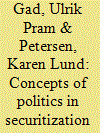

|
|
|
|
|
| Publication |
2011.
|
| Summary/Abstract |
The article argues that there are a number of concepts of politics in play in the current debates on securitization theory and that greater awareness regarding these conceptual differences helps clarify not only theoretical differences but also the possibilities for new theoretical development and reflection. The article identifies three conversations on politics: first, a conversation on how politics concerns action and intentionality; second, a conversation on the modern organization of politics, spheres and sectors; and, third, a conversation on the relationship between politics, ethics and science. Where the first and third conversations refer to politics as an act, in the second conversation politics is inherently tied to the institutional or spatial structures of government - the state, the public, the political field, spheres, sectors or function.
|
|
|
|
|
|
|
|
|
|
|
|
|
|
|
|
| 11 |
ID:
063026
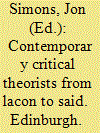

|
|
|
|
|
| Publication |
Edinburgh, The University Press, 2004.
|
| Description |
xi, 292p.
|
| Standard Number |
0748617205
|
|
|
|
|
|
|
|
|
|
|
|
Copies: C:1/I:0,R:0,Q:0
Circulation
| Accession# | Call# | Current Location | Status | Policy | Location |
| 049790 | 142/SIM 049790 | Main | On Shelf | General | |
|
|
|
|
| 12 |
ID:
113855


|
|
|
|
|
| Publication |
2012.
|
| Summary/Abstract |
Major powers are frequently urged to embrace grand strategies tied to particular International Relations theories. In the case of United States foreign policy, scholars generally analyse a well-known set of strategic choices - primacy, selective engagement, offshore balancing, collective security and cooperative security - favoured by relatively mainstream realist and liberal thinkers in International Relations. This article explores the evolution of cooperative security as an idea from its clear ties to liberal and neoliberal international relations theory to its current understanding in world politics, which is surprisingly consistent with many emancipatory ideals of critical International Relations theory. Cooperative security no longer merely implies multilateralism, negotiation and arms control. Rather, security is now more frequently described as indivisible, and genuine cooperation is said to require shared decision-making and consensual practices. Non-governmental organisations are more and more granted a voice in security discussions, as are international institutions. While weapons and warfare remain important security concerns, the cooperative security agenda today includes ideas associated with human security, including environmental calamity, global inequality and hunger.
|
|
|
|
|
|
|
|
|
|
|
|
|
|
|
|
| 13 |
ID:
062241
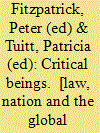

|
|
|
|
|
| Publication |
Aldershot, Ashgate Publishers, 2004.
|
| Description |
xx, 226p.
|
| Series |
Law, justice and power
|
| Standard Number |
0754622886
|
|
|
|
|
|
|
|
|
|
|
|
Copies: C:1/I:0,R:0,Q:0
Circulation
| Accession# | Call# | Current Location | Status | Policy | Location |
| 049690 | 342.0873/FIT 049690 | Main | On Shelf | General | |
|
|
|
|
| 14 |
ID:
080192
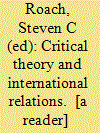

|
|
|
|
|
| Publication |
London, Routledge, 2008.
|
| Description |
xxv, 398p.
|
| Standard Number |
9780415954181
|
|
|
|
|
|
|
|
|
|
|
|
Copies: C:1/I:0,R:0,Q:0
Circulation
| Accession# | Call# | Current Location | Status | Policy | Location |
| 052996 | 327.101/ROA 052996 | Main | On Shelf | General | |
|
|
|
|
| 15 |
ID:
080193
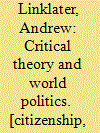

|
|
|
|
|
| Publication |
London, Routledge, 2007.
|
| Description |
viii, 240p.
|
| Standard Number |
9780415399296
|
|
|
|
|
|
|
|
|
|
|
|
Copies: C:1/I:0,R:0,Q:0
Circulation
| Accession# | Call# | Current Location | Status | Policy | Location |
| 052997 | 327.101/LIN 052997 | Main | On Shelf | General | |
|
|
|
|
| 16 |
ID:
097418
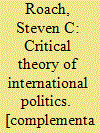

|
|
|
|
|
| Publication |
Oxon, Routledge, 2010.
|
| Description |
viii, 171p.
|
| Standard Number |
9780415774857
|
|
|
|
|
|
|
|
|
|
|
|
Copies: C:1/I:0,R:0,Q:0
Circulation
| Accession# | Call# | Current Location | Status | Policy | Location |
| 055039 | 327.101/ROA 055039 | Main | On Shelf | General | |
|
|
|
|
| 17 |
ID:
096038
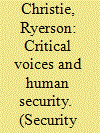

|
|
|
|
|
| Publication |
2010.
|
| Summary/Abstract |
Narratives of human security have been widely adopted and adapted within both academic and policy communities. Despite debates over its meanings and uses, the concept has proven to be remarkably resilient. In particular, there has a been a surprising willingness by critical scholars not only to analyse and critique human security, but also to embrace it as a means of furthering political goals. This article maps the ways in which various strands of critical scholarship in international relations have striven to use human security. It concludes by arguing that human security has lost any true critical potential and has become a new orthodoxy. Thus, while the concept may have value in highlighting particular issues and may enable short-term gains, it is unable to provide the basis for a substantive change of the system of international security.
|
|
|
|
|
|
|
|
|
|
|
|
|
|
|
|
| 18 |
ID:
107609
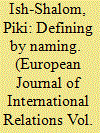

|
|
|
|
|
| Publication |
2011.
|
| Summary/Abstract |
Politics is a public effort directed at the allocation of resources, both material and symbolic. Quite often it involves conflict in the form of a public struggle over the allocation of resources. Informed by Antonio Gramsci's theory of hegemony, this article offers a political reading of constructivism (a theoretical perspective here called Political Constructivism). It maintains that politics is guided by a conscious effort by political agents to control the commonsensical understanding of social reality using the media of political concepts, metaphors, symbols, and - the focus of this article - names and definitions. Political agents regard controlling the commonsense as one of the most effective political tools. They understand that it can be controlled by attaching meanings to political concepts, by linking metaphors and symbols to ideas, and by linking events to classes of events through naming and defining. This article examines the civic warring in Israel over the defining and naming of the Second Lebanon War as a case in point. Defining and naming the event involved a political struggle to frame the commonsense, gain the upper hand in the political process of constructing socio-political reality, and reap the political gains. The article argues that the political struggle was resolved by what I call a weak Kripkean-like defining, in other words, defining by naming.
|
|
|
|
|
|
|
|
|
|
|
|
|
|
|
|
| 19 |
ID:
120086
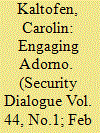

|
|
|
|
|
| Publication |
2013.
|
| Summary/Abstract |
Even though its focus on emancipation purposefully intends to build upon the intellectual legacy of the Frankfurt School, critical security studies has thus far only interpreted the Frankfurt tradition in a circumscribed manner. That is to say, it selectively drew on some concepts from critical theory that are most associated with Jürgen Habermas and Axel Honneth. However, as a result of this emphasis, Booth and Wyn Jones - the original proponents of critical security studies - give too little attention to thinkers such as Theodor W. Adorno. This article demonstrates that a re-engagement with Adorno's work not only provides a more complete appraisal of the Frankfurt School's thought, but also might reinvigorate critical security studies as a 'critical' approach to security. It proposes that such a result can be achieved by employing Adorno's ethics of resistance and through the development of the philosophical construct of a constellation of security.
|
|
|
|
|
|
|
|
|
|
|
|
|
|
|
|
| 20 |
ID:
089528
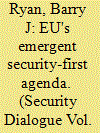

|
|
|
|
|
| Publication |
2009.
|
| Summary/Abstract |
This article forms a critique of security sector reforms implemented in Albania and Montenegro between 2000 and 2007 by and on behalf of the European Union. It argues that within these reforms it is possible to discern a tension between a more holistic development approach and a security-based approach that is top-down and largely founded on the self-referential security concerns of the European Union. Drawing on research conducted by the author in Albania and Montenegro, the article utilizes public surveys to point out the distance between internal security reforms funded by the EU and the everyday security concerns of residents living in ineffectively policed states. The article concludes that a security-first agenda has slipped into the EU's aim to create an area of `freedom, security and justice'. Thus, while the rims of the Western Balkans are being secured, lack of reform in the interior hampers the socio-economic development and democratization of states engaged in the EU enlargement process
|
|
|
|
|
|
|
|
|
|
|
|
|
|
|
|
|
|
|
|
|